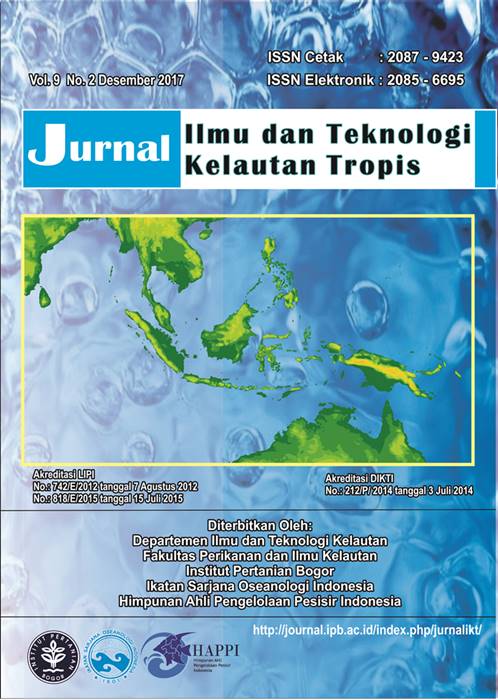LOBSTER FISHERY MANAGEMENT IN THE MARINE ECOSYSTEM APPROACH AT SIMEULUE ISLAND WATERS (WPP-NRI 572)
Abstract
The lobster fishery is one of the leading fisheries commodity on Simeulue Regency so that local government must manage wisely in order to maintain the sustainability of the lobster fishery. Aceh Government Regulation namely Qanun Aceh No. 7 of 2010 concerning fisheries already in effect. However, the institutional system has not functioned optimally in the management of lobster fisheries. The purpose this study is to examine the domain of fishing techniques, socio-economic and institutional management of lobster fisheries with ecosystem approaches in Simeulue waters. Research method using qualitative research. The method of data collection is survey method which is done by purposive sampling approach that is by doing depth responder interview which is considered informative and wide knowledge about the institute. Data analysis using EAFM analysis done with Flag Modeling technique. Based on the results of the study that the assessment of the fishing domain techniques and economic domains in aggregate showed bad category. Meanwhile, social domains and institutional domains show moderate categories so aggregate composites overall show fewer categories. It is therefore necessary to make a tactical decision from the bad to be better in accordance with the category of each EAFM domain.
Keywords: fisheries management with ecosystem approach (EAFM), WPP 572, Simeulue
Authors
This work is licensed under a Creative Commons Attribution 4.0 International License.
Jurnal Ilmu dan Teknologi Kelautan Tropis i is an open-access journal, meaning that all content is freely available without charge to the user or their institution. Users are allowed to read, download, copy, distribute, print, search, or link to the full texts of the articles in this journal without needing to request prior permission from the publisher or the author.
All articles published by Jurnal Ilmu dan Teknologi Kelautan Tropis are licensed under the Creative Commons Attribution 4.0 International License. This allows for unrestricted use, distribution, and reproduction in any medium, provided proper credit is given to the original authors.
Authors submitting manuscripts should understand and agree that the copyright of published manuscripts is retained by the authors. Copyright encompasses the exclusive rights of authors to reproduce, distribute, and sell any part of the journal articles in all forms and media. Reproduction of any part of this journal, its storage in databases, and its transmission by any form or media is allowed without written permission from Jurnal Ilmu dan Teknologi Kelautan Tropis.


